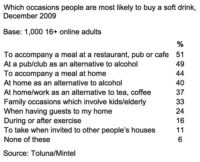 Made up of non-alcoholic drinks, including fruit and herb drinks packaged in a bottle and presses, the premium soft drinks market has grown despite challenging market conditions. Indeed, although the premium soft drinks market may only be a niche sector, last year the market topped the £100 billion barrier.
Made up of non-alcoholic drinks, including fruit and herb drinks packaged in a bottle and presses, the premium soft drinks market has grown despite challenging market conditions. Indeed, although the premium soft drinks market may only be a niche sector, last year the market topped the £100 billion barrier.
And what is more, latest research from Mintel, suggests that the market has the potential to take off significantly over the next 5-10 years. Today’s consumers are more wary about the ingredients in soft drinks, and drinks which provide natural, healthy and even functional properties are increasingly in demand.
There also continues to be a drive for premiumisation, meaning that the majority of consumers (seven out of ten) are comfortable with the idea of paying more for better quality. As Britain’s better -off ABC1 population continues to grow, this aspirational trend will only increase.
In terms of distribution, the off-trade is responsible for the vast majority of market sales, something that has been exacerbated by cash-squeezed consumers staying in more. However, there is considerable potential in the on-trade. Pubs are becoming more and more food-led and there is huge consumer demand for better quality and healthier drinking options. Consumers want better quality, choice and healthier soft drinks made available to them and the on-trade is having to adapt accordingly, premium soft drinks fit the bill perfectly.
The market is inhabited by a lot of small, farm-based local British companies. This is a major advantage for this sector, at a time when local provenance is considered increasingly ethical and authentic. So although many of these companies do not have the financial resources to increase awareness quickly, such an ‘anti-corporate’ approach has long-term branding advantages.
Looking at production, consumers are also increasingly spending their leisure time in the home, meaning that there is a demand for better quality products for themselves and their guests.
The market is expected to continue to increase healthily, growing by a quarter of its total value and a fifth of its volume over the next five years. As Britain slowly recovers from the effects of the recession, individual levels of PDI will rise, meaning that people will have more money to devote to discretionary purchases. With pubs becoming more food-led there is increasing potential to increase sales in this sector, which is crying out for a more premium soft drinks proposition.
However, one of the biggest challenges which the industry continues to face is low awareness. A fifth of the population have not heard of any brands within the sector, while only the long-established brand leaders (Shloer and Appletiser) are recognised by more than half the population.




Comments are closed.